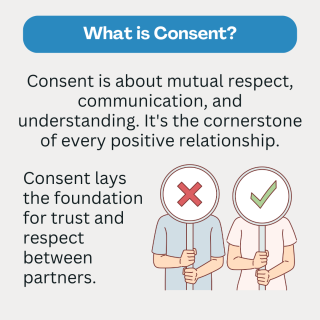Sex
Recent Research Encourages Therapists to Talk About Consent
Choking during sex is a new troubling trend. How can we keep clients safe?
Updated August 23, 2024 Reviewed by Monica Vilhauer Ph.D.

Every September 4th, the World Association of Sexual Health celebrates World Sexual Health Day. This year’s theme for WSHD is Healthy Relationships. Healthy relationships provide safe and consensual environments for all partners to feel respected in all aspects of their lives including sexual activity. Unfortunately, in the past 5-10 years, research has shown that there has been a large uptick in choking as a sexual trend among young people. Dr. Debby Herbenick, Director of the Center for Sexual Health Promotion at Indiana University, has conducted much of the research surrounding what up until only a few years ago had been a very rare form of kink behavior called breath play. According to Susan Wright, Executive Director of the National Coalition for Sexual Freedom (NCSF), who presented on this topic at the 2024 International Society for the Study of Women’s Sexual Health (ISSWSH) annual conference with Herbenick, the behavior is not sanctioned by NCSH and is considered controversial and high risk in kink and BDSM communities.
Choking Statistics:
One of the earlier surveys Herbenick and her colleagues conducted found that among sexually active undergraduates, 43.0% had choked a partner and 47.3% had been choked.
In a follow up study, Herbenick et al. found that a higher percentage of transgender or gender non-binary (TGNB+) students (68.6%) and women (50.0%) reported that being choked was very pleasurable. Cultural norms and expectations often lead women and sexual minorities to remain silent around the specific sexual behaviors they prefer and the boundaries they expect for their sexual health before consenting to sexual encounters. This sex therapist wonders whether those who consent to being choked might do it for reasons related to wanting to be hip or current, since there have been many more depictions of choking in sexually explicit media and in mainstream entertainment.
Choking Depictions in Media Outlets:
While porn has unfortunately been a major source of sex ed for teens for years, choking and rough sex has become more popular in mainstream media. “Fifty Shades of Grey”, and popular shows such as “Euphoria” and “The Idol”, depict choking with little discussion, and illustrate no safety concerns. While choking has worked its way into mainstream media and behavior, the way adults are prepared to discuss the sex they want before a sexual encounter has not changed much. According to SIECUS, only 2 states have an “A” rating on their sex education policies, meaning young adults enter their adult sexual lives with unrealistic notions on what they can ask for in partnered encounters.
Health Risks of Choking:
Those being choked are experiencing more force and for longer periods of time. Research shows that 1 in 5 students who are choked become “cloudy” — close to passing out, but not completely unconscious. Those choked reported lightheadedness, neck pain, headaches, temporary loss of coordination and ear ringing. Although these symptoms resolve quickly, according to the American Academy of Neurology, the restriction of blood flow to the brain, even for brief periods of time, can cause permanent injury, including stroke or cognitive impairment.

Dr. Keisuke Kawata, a neuroscientist, has been co-authoring studies with Dr. Herbenick and presented on the same panel at ISSWSH to discuss the association between sexual choking and neurophysiological responses. In their 2023 study, undergraduate women who were choked regularly were compared to a never-choked control group. The choked group showed a reduction in cortical folding in the brain, widespread cortical thickening, and skewed brain hemispheres, which are all associated with a higher risk of mental illness and mood disorders. It remains unclear whether women with mental health challenges are seeking out choking during intimacy, or if choking is causing these mental health challenges in the first place. However, the risk of worsening a woman’s cognitive health seems convincing.
Blurred Lines of Consent:

Teaching that “no means no” might be useful in some sexual encounters, but if someone is in a compromised position, verbal consent can be difficult to explicitly give or take away. In order to make rough sex safe for all, therapists must continue to have practical discussions about what clients have experienced, what they are hoping to experience, and how to state what they want and what their boundaries are. Even when hetero/bisexual female subjects stated they enjoyed being choked by their male partners, many also said that their partners never or only sometimes asked before choking them, at times creating moments where they could not breathe or speak, limiting the amount of consent they could give. Many acts that involve physical pleasure (i.e. receiving oral sex) tend to favor men, while those that may entail pain or submission are usually enacted upon women or TGNB+. What can therapists do to help unearth what their clients are consenting to, enjoying, desiring and risking in their sexual lives?
Conclusion:

By not discussing the rewards of mutual consent, pleasure, and the danger of choking in open conversation with clients, therapists have a large blindspot in the opportunity to provide critical sexuality education. Therapists need to be better educated and prepared to ask their adult clients about all the behaviors they do in sexual situations, including asking if they have been involved with choking. If therapists aren’t the ones bringing the topic of sex up, clients will feel less comfortable initiating the conversation. Psychotherapists can be trained to teach clients skills on how to communicate around pleasure, desires for specific behaviors, and setting boundaries before and during a sexual encounter.
Sex positivity is important to any psychotherapy practice. Talk to your clients and couples about:
- What realistic verbal and non-verbal cues are for giving and taking away consent.
- How male clients might speak with their female partners to learn more about what could bring them to orgasm.
- Encourage clients to practice in sessions saying what they are comfortable and uncomfortable with before going on dates and/or having sex with a partner.
By discussing all sexual behaviors more openly and neutrally with clients, therapists can help to create a safer, more pleasurable culture around intimacy
References
Herbenick D, Patterson C, Beckmeyer J, Gonzalez YRR, Luetke M, Guerra-Reyes L, Eastman-Mueller H, Valdivia DS, Rosenberg M. Diverse Sexual Behaviors in Undergraduate Students: Findings From a Campus Probability Survey. J Sex Med. 2021 Jun;18(6):1024-1041. doi: 10.1016/j.jsxm.2021.03.006. Epub 2021 May 19. PMID: 34020921.
Herbenick, D., Fu, Tc., Eastman-Mueller, H. et al. Frequency, Method, Intensity, and Health Sequelae of Sexual Choking Among U.S. Undergraduate and Graduate Students. Arch Sex Behav 51, 3121–3139 (2022). https://doi.org/10.1007/s10508-022-02347-y
Hou J, Huibregtse ME, Alexander IL, Klemsz LM, Fu TC, Fortenberry JD, Herbenick D, Kawata K. Association of Frequent Sexual Choking/Strangulation With Neurophysiological Responses: A Pilot Resting-State fMRI Study. J Neurotrauma. 2023 Jul;40(13-14):1339-1351. doi: 10.1089/neu.2022.0146. Epub 2023 Feb 28. PMID: 36565025; PMCID: PMC10294564.
Sheff, E. (2021). Kinky sex gone wrong: Legal prosecutions con- cerning consent, age play, and death via BDSM. Archives of Sexual Behavior, 50(3), 761–771. https://doi.org/10.1007/ s10508-020-01866-w


